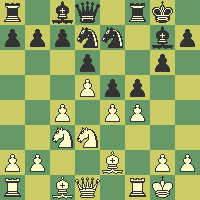
New York State Championship, 1978.
White: Col. Sicherman
King's Indian Defense.
Black: S. Weeramantry
1. Nf3 Nf6; 2. d4 g6; 3. c4 Bg7; 4. Nc3 d6; 5. e4 O-O; 6. Be2.
I usually played the Saemisch Variation, but Weeramantry—a former state champion—didn't seem cast for the role of innocent victim.
6... e5; 7. O-O Nc6; 8. d5 Ne7; 9. Ne1 Nd7; 10. Nd3.
This is the very last variation in the old Informant classification. It's also the very last move in my knowledge of the line.
10... f5; 11. f4!?

But this unexpected reply annuls my opponent's knowledge of the line. I still have hopes that Larry Kaufman will get around to analyzing my gambit in Chess Life.
11... exf4; 12. Bxf4.
Crossing the Rubicon. After 12. Nxf4 Nc5; 13. exf5 Bxf5 it's just a game.
12... Bxc3; 13. bxc3 fxe4; 14. Nb4 Nf5.
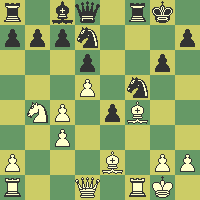
Too aggressive? Black's extra pawn is forward and his deployment is backward. Can he hold on?
15. Qd2 Nc5; 16. g4! Ng7.
Unattractive is 16... Ne7; 17. Bh6 Rxf1+; 18. Rxf1.
17. Bg5 Qe8; 18. Rxf8+ Qxf8; 19. Rf1 Qe8; 20. Bf6.
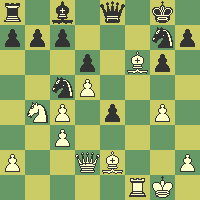
White maintains the pressure.
20... Nd7; 21. Bd4 Ne5; 22. Qf4.
Black must give back the pawn, but first—
22... c5; 23. dxc6 bxc6.
The zwischenzug 23... Ne6 would keep more options open.
24. c5!
This clearance sacrifice not only prevents the fork with ...c5, it opens a highway for my light-squared bishop. The prosaic 24. Bxe5, intending to win the pawn with the knight, leads to less.
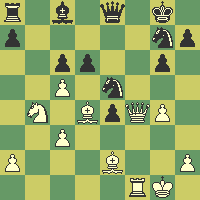
24... Ne6; 25. Qxe4 Bd7.
Till now neither of us had spent much time, but here Weeramantry spent half an hour looking at 25... Nf7 and 25... dxc5. Neither is clear!
26. cxd6.
More positional would be 26. Bxe5 dxe5; 27. Bc4.
26... Nxd4.
I expected 26... Nf7; 27. Be3 Nxd6; 28. Qe5 Nf7; 29. Qf6.
27. Qxd4 (27. cxd4? Nxg4) Qe6; 28. Bd1 c5!
White threatened 29. Bb3. This sacrifice clears the way for Black's light-squared bishop. By now my clock is catching up with his.
29. Qe4.
Black would be more active after 29. Qxc5 Rc8; 30. Qd4.
29... Re8; 30. Nd5 Bc6; 31. Bb3 Kg7.
A sound instinct, but we shall see that 31... Kh8 was more precise. After 31... c4, 32. Bxc4 Nxc4; 33. Nf6+! Qxf6! (33... Kh8; 34. d7); 34. Qxc4+ Qe6; 35. Qxc6 Rc8; 36. Qb7 Qxg4+; 37. Kh1 Black has an uphill fight. Also interesting is 34. Qxe8+ with a rook and two pawns against the odd couple.
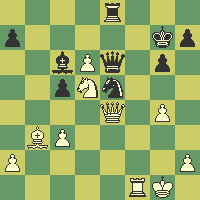
32. Nc7!
Playing for the better endgame. The position was getting too drafty.
32... Bxe4; 33. Nxe6+ Kh8; 34. Nxc5 Bc6.
After 34... Nf3+; 35. Kf2 Nxh2; 36. Rg1 Bc6; 37. d7 White would still have the upper hand.
35. Be6 Kg7; 36. d7 Rd8; 37. g5!
Yet another pawn sacrifice, this time for gain of time. Black has no counterchances unless he accepts.
37... Nf3+; 38. Kf2 Nxg5; 39. Ke3 h5.
Intending to eliminate the white bishop's defense of the pawn with 40... Kh6. If 39... Kh6 at once, White has 40. Bg4. But now Black loses more time.
40. h4 Nh7; 41. Rf7+ Kh6.
After 41... Kh8 White would have Nc5-d3-e5.
42. Kf4 g5+!
The only way to free the position.
43. hxg5+ Kg6 (43... Nxg5?? 44. Rf6+); 44. Ke5!??
Missing an easy win in time trouble: 44. Nd3 Nxg5; 45. Ne5+ Kh6; 46. Rf6+ Kg7; 47. Kxg5.
44... Nxg5; 45. Re7 h4.
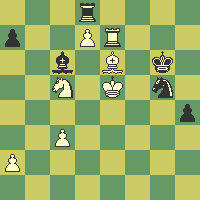
The passed pawn tries to make trouble, but White's king will decide—if the clock doesn't decide first.
46. Bf5+ Kh6; 47. Kd6 Bxd7; 48. Nxd7 h3; 49. Kc7 h2; 50. Re1 Rh8; 51. Rh1 Kg7; 52. Kd6 Nf3; 53. Kd5 Rh5; 54. Ke4 Nd2+; 55. Kf4 Nf1.
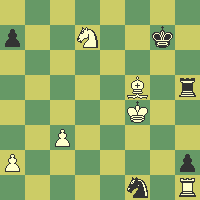
Second time control. Now that we have time to think again, it is clear that Black has only a few more shots left.
56. Bg4 Rh8; 57. Ne5 Rf8+; 58. Kg5 Rf2; 59. Nf3.
The pawn on h2 will fall. Black regains it at the cost of a lost endgame. The bishop is right for the rook pawn.
59... Ng3; 60. Rxh2 Ne4+; 61. Kf4 Rxh2; 62. Nxh2 Nxc3; 63. Be6 Kf6; 64. Bc4 Ke7; 65. Ke5 Kd7; 66. Kd4 Na4??
Battle fatigue. The game had gone six hours, and Mr. Goichberg was relieved at not having to spend yet another hour in Albany.
67. Bb5+ 1:0.
This opening variation can be yours for half price—it's a clearance!